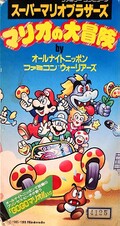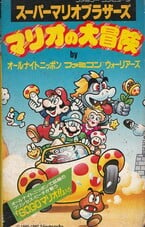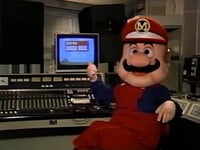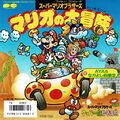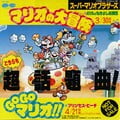Mario no Daibōken: Difference between revisions
m (Text replacement - "(\| *)Jap([RMCN\d]* *=)" to "$1Jpn$2") |
(→Notes: The segment about glitches is already mentioned on the article) Tags: Manual revert Mobile edit Advanced mobile edit |
||
| (6 intermediate revisions by 4 users not shown) | |||
| Line 1: | Line 1: | ||
{{italic title|''Mario no Daibōken''}} | {{italic title|''Mario no Daibōken''}} | ||
{{ | {{Another language|Japanese}} | ||
{{about|the Japan-exclusive strategy guide video tape for ''[[Super Mario Bros.]]''|its associated vinyl record single featuring two exclusive songs|[[Mario no Daibōken (album)]]|the serialized [[Nintendo Power]] comic also known as ''Mario no Daibōken'' in Japan|[[Super Mario Adventures]]}} | {{about|the Japan-exclusive strategy guide video tape for ''[[Super Mario Bros.]]''|its associated vinyl record single featuring two exclusive songs|[[Mario no Daibōken (album)]]|the serialized [[Nintendo Power]] comic also known as ''Mario no Daibōken'' in Japan|[[Super Mario Adventures]]}} | ||
{{multiple image | {{multiple image | ||
| Line 20: | Line 20: | ||
All of this is regularly interrupted by live-action segments featuring a Mario mascot costume who can be seen playing the game. Mario introduces new segments and gives commentary, and he plays a prominent role in the "GO GO Mario!!" music video shown at the end of the VHS. | All of this is regularly interrupted by live-action segments featuring a Mario mascot costume who can be seen playing the game. Mario introduces new segments and gives commentary, and he plays a prominent role in the "GO GO Mario!!" music video shown at the end of the VHS. | ||
A vinyl single for this video, also entitled ''[[Mario no Daibōken (album)|Mario no Daibōken]]'', was released on March 30, 1986, but neither of the two songs featured on the record ("Mario no Daibōken" and " | A vinyl single for this video, also entitled ''[[Mario no Daibōken (album)|Mario no Daibōken]]'', was released on March 30, 1986, but neither of the two songs featured on the record ("Mario no Daibōken" and "[[Koopa Ichizoku Kazoe Uta]]") were featured in the actual video. The single had an exclusive promotional version titled ''[[Mario no Daibōken/GO GO Mario!!]]'', which replaced "Koopa Ichizoku Kazoe Uta" with "GO GO Mario!!" | ||
{{br}} __NOTOC__ | {{br}} __NOTOC__ | ||
| Line 40: | Line 40: | ||
}} | }} | ||
== | ==Notes== | ||
*The art featured on the covers for both the video and the record would later be repurposed and modified to serve as the box art for ''[[All Night Nippon: Super Mario Bros.]]''<ref name=VHS /> | *The art featured on the covers for both the video and the record would later be repurposed and modified to serve as the box art for ''[[All Night Nippon: Super Mario Bros.]]''<ref name=VHS /> | ||
Latest revision as of 07:08, March 25, 2025
The title of this article is official, but it comes from a Japanese source.
If an acceptable English name is found, then the article should be moved to the new title.
- This article is about the Japan-exclusive strategy guide video tape for Super Mario Bros. For its associated vinyl record single featuring two exclusive songs, see Mario no Daibōken (album). For the serialized Nintendo Power comic also known as Mario no Daibōken in Japan, see Super Mario Adventures.
Mario no Daibōken is an obscure VHS and Betamax strategy guide released in Japan in 1986 by Pony Canyon for Super Mario Bros. It features tips for various levels, live-action segments starring a Mario mascot costume, and "GO GO Mario!!," a lyrical version of the game's Ground Theme. "GO GO Mario!!" would later be released as a single in Japan.
The video guides the viewer through a quick playthrough of Super Mario Bros., starting in World 1-1, using the Warp Zone in World 1-2 to warp to World 4, and using World 4-2's Warp Zone to warp to World 8 and complete the game.
The video also shows a variety of secrets, such as the aforementioned Warp Zones in World 1-2 and World 4-2, various hidden 1-Up locations, and the infinite 1-Up trick in World 3-1. The video contains a rare instance of Nintendo officially showcasing and endorsing the use of glitches in its games, featuring a segment all about various bugs present in the game.
All of this is regularly interrupted by live-action segments featuring a Mario mascot costume who can be seen playing the game. Mario introduces new segments and gives commentary, and he plays a prominent role in the "GO GO Mario!!" music video shown at the end of the VHS.
A vinyl single for this video, also entitled Mario no Daibōken, was released on March 30, 1986, but neither of the two songs featured on the record ("Mario no Daibōken" and "Koopa Ichizoku Kazoe Uta") were featured in the actual video. The single had an exclusive promotional version titled Mario no Daibōken/GO GO Mario!!, which replaced "Koopa Ichizoku Kazoe Uta" with "GO GO Mario!!"
Gallery[edit]
Mario no Daibōken vinyl record single
Mario no Daibōken/GO GO Mario!! vinyl record single
Names in other languages[edit]
| Language | Name | Meaning | Notes |
|---|---|---|---|
| Japanese | マリオの大冒険[1] Mario no Daibōken |
Mario's Great Adventure |
Notes[edit]
- The art featured on the covers for both the video and the record would later be repurposed and modified to serve as the box art for All Night Nippon: Super Mario Bros.[1]
